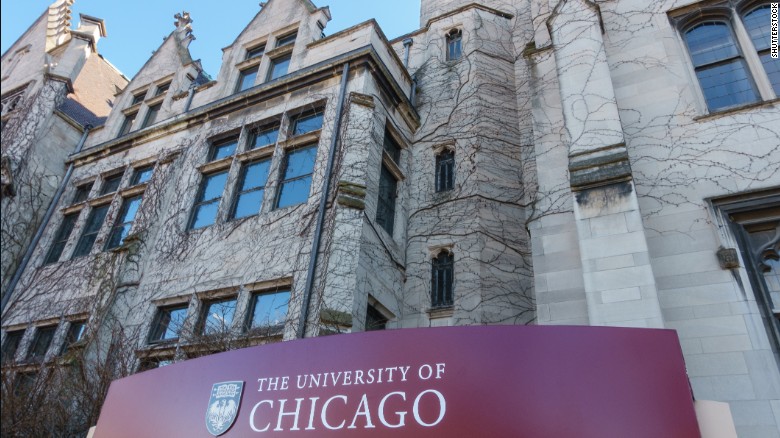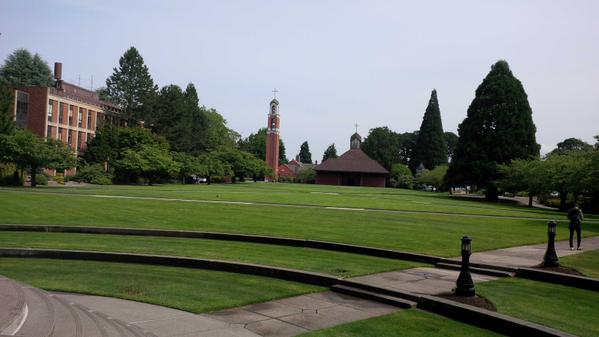As freshman were arriving at the University of Chicago, they were met by a letter from the Dean of Students that stated,
Our commitment to academic freedom means that we do not support so-called ‘trigger warnings,’ we do not cancel invited speakers because their topics might prove controversial, and we do not condone the creation of intellectual ‘safe spaces,’ where individuals can retreat from ideas and perspectives at odds with their own.
While there are lots of parts to the story, Beth McMurtrie’s analysis, With a Strong Stance on Safe Spaces, U. of Chicago Sends a Mixed Message to Students, highlights the contradiction at the heart of this letter. Her analysis highlights that the Dean emphasizes
- academic freedom, the free exchange of ideas, and the need to listen to viewpoints with which we disagree
- while at the same time excluding perspectives that advocate “safe spaces” and “trigger warnings.”
In other words, the Dean of Students takes the position we should tolerate all ideas except the ideas he disagrees with, engage in freedom of thought as longs as the thoughts agree with his.
I have always found this kind of logic maddening, precisely because it is the same logic that was so often used against theology and the religious identity of Catholic colleges and universities. In the spirit of tolerance, theology became marginalized in higher education, even in Catholic colleges and universities. The thinking was that theology was done from a particular perspective and operated with particular presuppositions, so how could it be tolerant of those with different views? Thus, it was excluded.
The issue turned on the belief that theology entailed a commitment and tolerance was neutral. Of course, this academic view of tolerance was not, in fact, neutral but a particular position. In pretending to be neutral though, it was able to push theology and Catholic identity to the fringes as contrary to academic pursuits. (It is a position still present today.)
This is the same contradiction that is at play with the Dean of Students at the University of Chicago. He wants the free exchange of ideas as long as the ideas share his presuppositions about what are legitimate ideas. In his view, “safe spaces” and “trigger warnings” are not legitimate. They are only “so—called” ideas. Perhaps, instead of issuing an edict from administrative authority, he should have suggested an academic debate about the legitimacy of these ideas?
This is why I like Catholic identity. It is not because it is always perfect. It is clearly not. It is not that it doesn’t cause any problems. It clearly does. It is just that it makes the position of the institution explicit. It means that there are values and principles held, from which people can argue and by which people are bound. In doing so, the free exchange of ideas can occur. Without a position that is explicit, the free exchange of ideas is so much more complicated. Rarely is an idea worked out in debates framed by agreed upon principles. Instead, as with the Dean of Students at the University of Chicago, one set of ideas is label as only “so-called” ideas and they are excluded, not by argument, but by whomever is holding the seat of power.






Thanks for posting on this, Jason. You are right to point out that Catholic schools are able to make explicit assumptions about discourse that are unavoidable – but often only implicit – elsewhere. But I do think the Chicago letter requires that one read it in context – it seems to me that the letter indicates Chicago intends to be a different sort of space than the ones emerging elsewhere, one that holds to (old-fashioned!) notions of challenging academic discourse that is not primarily concerned with the therapeutic (or even political) effects of such discourse. In the spirit of MacIntyre’s Three Rival Versions, it seems better that universities stake out different models – because in fact, what is being experienced by secular universities now is a tension between the modern and postmodern projects, now exacerbated by certain tendencies in parenting and earlier schooling. The fact that an institution like Chicago is willing to stake out a practical position on these matters seems to me to be helpful to the larger debate, rather than stifling to it.
I think what gets me is not the taking of a position but the pretense that the taken position is neutral. The Dean’s letter – which I do not see as encompassing the whole of the University of Chicago – boasts of academic discourse “without fear of censorship” and then in the following sentences defines what discourse is, effectively censoring some positions. The presumed neutral position, revealed in the contradiction, is the issue because it masks a position by claiming it is “without censorship” when it is clearly censoring some positions.
Thanks, Jason, for this post and for the questions you raise. I’m still curious what you think about safe spaces though and if there is a middle ground position we should defend. I think a lot of the debate has to do with (1) epistemology & learning effectiveness; & (2) misuse of professorial power in the classroom. With regard to #1, we ask “how do I know what I know?” And we have to admit that past experiences form learners in the classroom. If a student is a trauma survivor don’t we have an obligation to help him/her learn in a way that does not re-traumatize? But then I also want to push back against the extreme of the protectionist movement that wants to protect students from having to hear ideas that challenge them. Learning is hard and can make us uncomfortable. But with regard to #2, how do we draw the line? When is discomfort in the classroom just a part of the learning experience and when it is unsafe? Who decides? And how do race, class, & sexual orientation factor in here? I think it is all really complicated. My strategy is to do my best to make my classes safe for all students. I give trigger warnings. I tell them when a reading will have sexually explicit content (Pornland, for example). I tell students that the reading might make them angry (Letter on the Pastoral Care of Homosexual Persons, for example). But I also have had students tell me that in taking my class and doing the readings (on abortion, pornography, sexual violence) they were able to find healing because they were given tools to process their experiences. And of course there may have been other students who had negative reactions but who never came to talk to me about it.
Emily, thanks for the reply. I think I’m in agreement with everything you said in your comment and approach my classes in much the same way. I believe learning is “hard and can make us uncomfortable”, and, while I do what I can to make it easier, you cannot get rid of the challenge altogether. Thus, I do provide warnings to both respect students and address difficult material. For me–and it sounds like it is the same for you–this is part of a pedagogy. What struck me with the Dean’s letter was an absence of a supporting pedagogy. I wanted the argument of how not using trigger warnings and not having safe spaces fosters more agile thinking. This pedagogical argument was missing. I think if we had it — instead of the facile dismissal of these issues — we could better find that middle ground position that teachers desire: pushing enough to grow but not pushing so much as to break.